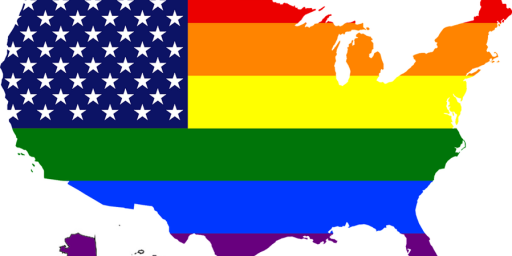Judge: Rhode Island Gays Can Wed in Massachussetts
Another loophole has opened in the gay marriage front, with a judge ruling that Rhode Island gays can marry in Massachusetts.
A gay couple from Rhode Island has the right to marry in Massachusetts because laws in their home state do not expressly prohibit same-sex marriage, a judge ruled Friday.
Wendy Becker and Mary Norton of Providence argued that a 1913 law that forbids out-of-state residents from marrying in Massachusetts if their marriage would not be permitted in their home state did not apply to them because Rhode Island does not specifically ban gay marriage.
Superior Court Judge Thomas Connolly agreed. “No evidence was introduced before this court of a constitutional amendment, statute, or controlling appellate decision from Rhode Island that explicitly deems void or otherwise expressly forbids same-sex marriage,” he ruled.
Although the ruling allows same-sex couples from Rhode Island to get married in Massachusetts, the Massachusetts court has no power to ensure that Rhode Island recognizes such marriages. No other states are affected.
The ruling is rather bizarre. Presumably, if same-sex marriage were legally permissible in Rhode Island, Becker and Norton could save themselves a trip to Massachusetts, not to mention court costs, and just get married in Rhode Island.
One wonders what’s stopping them. . .






Well apparently the evidence that Rhode Island doesn’t allow gay marriage based on the fact that they went to the trouble and expense to leave their state, go to another state, file suit in the other state, etc. didn’t fit the decision that the court wanted to reach, so it was ignored.
I also like the way the Massachusetts judge is interpreting the Rhode Island constitution and laws. Nothing in there because he apparently looked and didn’t find it. And people wonder why voters keep approving the anti-gay marriage amendments.
Maybe the infrastructure is not ready in RI for them to get married there.
But, as I said on my own blog (quoting the judge):
What do you wanna bet that there will be by November?
YAJ: While I don’t think that the MA court should be interpreting the law of RI, and while I actually disagree in principle with their decision, I don’t think it holds water to say that they can’t interpret another state’s laws. I mean, it’s not like each state has a secret code.
Michael Demmons,
The interpretation is binding on Rhode Island, but I do find a problem with another state deciding what a different states laws say. To take a really horrific example, imagine a man would dig up fresh graves and eat the flesh of the corpse was captured in another state. He appeals extradition on the grounds that nothing in the state law specifically precludes cannibalism. The judge looks it over and says that since he can’t find anything in the state laws on cannibalism, he won’t extradite. Is it really up to that judge to decide if the state could prosecute? Would you be happy as a resident of that state for the other state judge to make the decision? I am trying to use a really horrific example to take the policy question out of gay marriage. Remember, in this case the judge is ignoring the terms “bride” and “groom” when he looked at the state law. He is being careful in his words. Not that there was “nothing”, but nothing explicit. The fact that the terms bride and groom have been around for longer than Massachusetts with specific genders attached is ignored because it wasn’t “explicit”.
Like the original court decision to find a right to gay marriage in a document that had been around a long time with no suspicion of that right being in the state constitution, I think what this will do is add more impetus to the pushes for anti-gay marriage amendments. You can’t trust your state court judges to rule correctly because they may not even get a chance to rule on the subject. Given the overwhelming margins these amendments have been passing (in red and blue states) this may be a tactical victory but it is a strategic defeat.
How else is he supposed to tell if RI has banned gay marriage? Perhaps he should’ve called a psychic hotline?
At any rate, the ruling was fine. Mass laws forbids marriages when the parties’ home state bans their marriage; RI has no laws doing that; ergo, they can get married in Mass. This is as simple a ruling as there can possible be.
Actually, you’re using a really stupid example to show that you have no idea what this about. The Mass decision has no effect on RI’s law. All that’s happened is that the Mass decision has given the potential plaintiffs alternate grounds for standing in a lawsuit challenging a county clerk’s refusal to provide a marriage license.
I see why you wrote that zany comment now. At first I thought this sentence was a typo – I mean, who would think that one state’s ruling can be binding on another state? Well, Mass’s ruling isn’t binding. There are two ways in which the Full Faith & Credit clause won’t force RI to recognize the marriage: first is statutory: DOMA carves out an exception for gay marriage. The second is judicially made: there’s an exception for matters of public policy (and has historically been applied to marriage and family law).